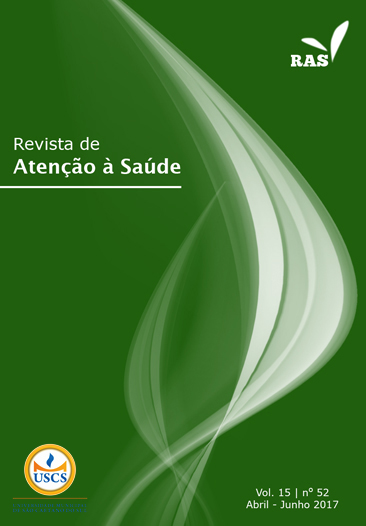Health status and quality of life in elderly assisted in a social responsibility program
DOI:
https://doi.org/10.13037/ras.vol15n52.4196Keywords:
Old people, Socialization, Motor activity, Quality of lifeAbstract
Introduction: Old age is not a disease. It is a phase of life with its own characteristics and values, in which changes in the individual, both in organizational structure – metabolism, biochemical balance, immunity, nutrition, functional mechanisms – and in intellectual and emotional characteristics. Objective: To evaluate the health status and quality of life in old people assisted in a social responsibility program. Materials and methods: A descriptive cross-sectional study with a strategy of quantitative analysis of the results, carried out at the social responsibility program Senior Institute, Fortaleza (Ceará), Brazil. Data collection was conducted from August to November 2013, through the implementation of a structured questionnaire in which personal data and information about old people’s perspective on the project were obtained. Results: Regarding the assessment of services of the project, we noted the need for improvements in physical space with the objective of improving the quality of service. With reference to benefits and improvements in quality of life 100% (n=40) of participants showed great satisfaction with the service and reported that the project has brought many benefits and autonomy in their daily lives. Conclusion: Old people feel happy to participate in the project and in the proposed activities, and that little is to be faulted. The relationship with other old people in this support group helps the person emotionally, promoting well-being and quality of life.
Downloads
References
1. Rodrigues RAP, Kusumota L, Marques S, Fabrício SCC, Cruz IR, Lange C. Política nacional de atenção ao idoso e a contribuição da enfermagem. Texto Contexto Enferm. 2007;16(3):536-45.
2. Instituto Brasileiro de Geografia e Estatística [homepage na Internet]. Perfil dos idosos responsáveis pelos domicílios no Brasil: 2000. [citado em 2017 jun 26]. Disponível em: https://goo.gl/MaZUCk
3. Souza GAJ, Iglesias GRCA. Trauma no idoso. Rev Assoc Med Bras. 2002;48(1):79-86.
4. Andrews GA. Los desafíos del proceso de envejecimiento en las sociedades de hoy e del futuro. In: Anais do Encuentro Latinoamericano y Caribeño sobre las Personas de Edad; 1999 set. 8-10; Santiago, Chile. Santiago: Celade; 2000. p. 247-56.
5. Lara CJ. Atenção aos idosos. Aleluia [periódicos na Internet]. Arapongas: IPRB; 2008 [citado em 2013 maio 11]. Disponível em: https://goo.gl/SQLqtH
6. Agostinho P. Perspectiva psicossomática do envelhecimento. Rev Port Psicos. 2004;6(1):31-6.
7. Joia CL, Ruiz T, Donalisio MR. Condições associadas ao grau de satisfação com a vida entre a população de idosos. Rev Saúde Públ. 2007;41(1):131-38.
8. Freire SA. Envelhecimento bem-sucedido e bem-estar psicológico. In: Neri AL, Freire SA, organizadoras. E por falar em boa velhice. Campinas: Papirus; 2000. p. 21-31.
9. Papeléo-Netto M, Ponte JR. Envelhecimento: desafio na transição do século. In: Papeléo-Netto M, Ponte JR, editores. Gerontologia. São Paulo: Atheneu; 2002. p. 3-12.
10. Lima-Costa MF, Veras R. Saúde pública e envelhecimento. Cad Saúde Pública. 2003;19(3):700-1.
11. Veras R. Em busca de uma assistência adequada à saúde do idoso: revisão da literatura e aplicação de um instrumento de detecção precoce e de previsibilidade de agravos. Cad Saúde Pública. 2003;19(3):705-15.
12. Veras R, Caldas CP, Araújo DV, Kuschnir R, Mendes W. Características demográficas dos idosos vinculados ao sistema suplementar de saúde no Brasil. Rev Saúde Pública. 2008;42(3):497-502.
13. Ciconelli RM, Ferraz MB, Santos W, Meinão I, Quaresma MR. Tradução para a língua portuguesa e validação do questionário genérico de avaliação de qualidade de vida SF-36 (Brasil SF-36). Rev Bras Reumatol. 1999;39(3):143-50.
14. Nakagava BKC, Rabelo JR. Perfil da qualidade de vida de mulheres idosas praticantes de hidroginástica. Movimentum Rev Dig Ed Fis. 2007;2(1):1-14.
15. Domiciano BR, Braga DKAP, Silva PN, Santos MPA, Vasconcelos TB, Macena RHM. Função cognitiva de idosas residentes em instituições de longa permanência: efeitos de um programa de fisioterapia. Rev Bras Geriatr Gerontol. 2016;19(1):57-70.
16. Moscovici S. Representações sociais: investigações em psicologia social. Petrópolis: Vozes; 2004.
17. Catalan-Matamoros D, Gomez-Conesa A, Stubbs B, Vancampfort D. Exercise improves depressive symptoms in older adults: an umbrella review of systematic reviews and meta-analyses. Psychiatry Res. 2016;244:202-9.
18. Jerez-Roig J, Oliveira NPD, Lima Filho BF, Bezerra MAF, Matias MGL, Ferreira LM, et al. Depressive symptoms and associated factors in institutionalized elderly. Exp Aging Res. 2016;42(5):479-91.
19. Mendes MRSSB, Gusmão JL, Faro ACM, Leite RCBO. A situação social do idoso no Brasil: uma breve consideração. Acta Paul Enferm. 2002;18(4):422-26.
20. Shephard RJ. Envelhecimento, atividade física e saúde. São Paulo: Phorte; 2003.
21. Hazzard W, Brerman EL, Blass JP, Ettinger WH, Halter JB. Principles of geriatric medicine and gerontology. 3rd ed. New York: McGraw Hill; 1997.
22. Kelly SDM. Prevalent mental health disorders in the aging population: issues of comorbidity and functional disability. J Rehabil. 2003;69(2):19-25.
23. Minas Gerais. Secretaria de Estado de Saúde. Atenção à saúde do idoso. Belo Horizonte: SAS/MG; 2006.
24. Carneiro LS, Fonseca AM, Vieira-Coelho MA, Mota MP, Vasconcelos-Raposo J. Effects of structured exercise and pharmacotherapy vs. pharmacotherapy for adults with depressive symptoms: a randomized clinical trial. J Psychiatr Res. 2015;71:48-55.
25. Neri AL. Qualidade de vida na velhice e atendimento domiciliário. In: Duarte YAO, Diogo MJD, editoras. Atendimento domiciliar: um enfoque gerontológico. São Paulo: Atheneu; 2000. p. 33-47.
26. Silva MAD, De Marchi R. Saúde e qualidade de vida no trabalho. São Paulo: Best Seller; 1997.
27. Zimerman GI. Velhice: aspectos biopsicossociais. Porto Alegre: Artes Médicas Sul; 2000.
28. Leite PF. Aptidão física, esporte e saúde. São Paulo: Robe; 2000.
29. Neri AL. Psicologia do envelhecimento: uma área emergente. In: Neri AL, organizadora. Psicologia do envelhecimento. Campinas: Papirus; 1995. p. 13-40.
30. Katz S. Busy bodies: activity, aging, and the management of everyday life. J Aging Stud. 2000;14(2):135-52.
31. Moraes MPI, Sousa IAFC, Vasconcelos TB. Relação entre a capacidade funcional e mobilidade com a prática de atividade
física em idosos participantes de uma associação. Ciênc Saúde. 2016;9(2):90-95.
Downloads
Published
Issue
Section
License
Copyright (c) 2017 Charliny Costa da Silva, Carlos Ariel Souza de Oliveira, Esdras Daniel de Sousa, Thiago Brasileiro de Vasconcelos, Geórgia Maria Lopes da Silva, Vasco Pinheiro Diógenes Bastos

This work is licensed under a Creative Commons Attribution-NonCommercial-NoDerivatives 4.0 International License.
Policy Proposal for Journals offering Free Delayed Access
Authors who publish in this magazine agree to the following terms:
- Authors maintain the copyright and grant the journal the right to the first publication, with the work simultaneously licensed under a Creative Commons Attribution License after publication, allowing the sharing of the work with recognition of the authorship of the work and initial publication in this journal.
- Authors are authorized to assume additional contracts separately, for non-exclusive distribution of the version of the work published in this magazine (eg, publishing in institutional repository or as a book chapter), with the acknowledgment of the authorship and initial publication in this journal.
- Authors are allowed and encouraged to publish and distribute their work online (eg in institutional repositories or on their personal page) at any point before or during the editorial process, as this can generate productive changes, as well as increase impact and citation of the published work (See The Effect of Open Access).









